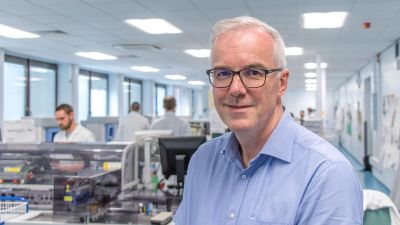NHS Tayside becomes first area in the world to 'effectively eliminate' hepatitis C

Words by ITV News Multimedia Producer Connor Parker
Tayside in Scotland has become the first place in the world to "effectively eliminate" hepatitis C, 11 years ahead of target.
NHS Tayside, which covers the area in and around Dundee, claims it is the first region in the world to eradicate the virus ahead of the Scottish government's 2024 target.
The World Health Organisation (WHO) has set a target for 90% of patients to be diagnosed, and 80% treated, by 2030.
Hepatitis C is a blood-borne virus that affects the liver and can lead to liver failure, liver cancer, or cirrhosis.
Around 90% of infections come from people who have injected drugs through shared needles.
Consultant hepatologist and gastroenterologist Professor John Dillon told ITV News their approach was to go directly to places where people were still injecting drugs to stop them from spreading the virus.
Drug user speaks about his experience with the hepatitis C treatment
Professor Dillon said: "We simplified the treatment and took the treatment to the people rather than the people coming to the treatment.
"Before you had to go through exhaustive tests to make sure you were suitable for treatment and prove they were reliable enough to take the treatment.
"We changed it to turning up to where people regularly went for support and provided them with treatment there."
The idea of treatment as a form of prevention to limit the spread of the disease was helped by the recent invention of the drugs Epclusa and Mavrit.
A drug user who wished to remain anonymous that took part in the project told ITV the new treatment was "very very easy."
"A lot of people wouldn't get tested because of the stigma of the old treatment and the side effects of it," Professor Dillon said.
"The new treatment had no side effects, no nausea, and your sleeping pattern got better."
The new drugs meant treatment could be handled with a once a day tablet over eight weeks, rather than weekly injections for a year that would often leave the patient ill for extended periods.
There were 1,187 drug-related deaths registered in Scotland in 2018 - above 1,000 for the first time and up 253 (27%) on the previous year.
In 2019 Scotland had the worst rate of drug deaths in the developed world, with the number of people dying doubling since Nicola Sturgeon became first minister.
Since testing at community clinics began, NHS Tayside has diagnosed 1,970 people, who are still alive and living in Tayside, and treated in excess of 1,800 people.
Professor Dillon said he'd been working to replicate the treatment nationwide and it had already been adopted by the Scottish government, with England copying many of the tactics.
He added he'd been in talks with people in Spain, Australia, Canada, and other places around the world to replicate the policy globally and help the planet reach the WHO's 2030 target.
Professor Dillon said: "Hopefully by demonstrating what we've achieved in Tayside if we can do it here then it's possible, many people were doubtful you could reach the people necessary to control the virus.
"If we can do it everyone can do it."
Lorna Birse-Stewart, chairwoman of NHS Tayside’s board, said: “I am delighted to announce on World Hepatitis Day that NHS Tayside has now also achieved the Scottish Government’s 2024 target of a 90% reduction in prevalence of hepatitis C, making it the first region in the world to effectively eliminate the virus.
“It is testament to the work of the teams involved and, as a Board, we are very proud of them.”
Professor Dillon said the project started around 10 years ago and to have finally achieved its goal was a "slightly surreal moment."
"It seems hard to believe that we've actually done it, that we've actually crossed the threshold.
Public Health Minister Joe FitzPatrick said: “NHS Tayside should be congratulated and recognised for this achievement.
“NHS Tayside has led the way in developing innovative approaches to tackling hepatitis C, and I commend the hard work and commitment of all involved – it demonstrates the benefits of good leadership and collaborative working, and it will improve the lives of all those affected.”
The project has been able to continue despite coronavirus which led to many of the people on the team being redeployed to help fight the pandemic.